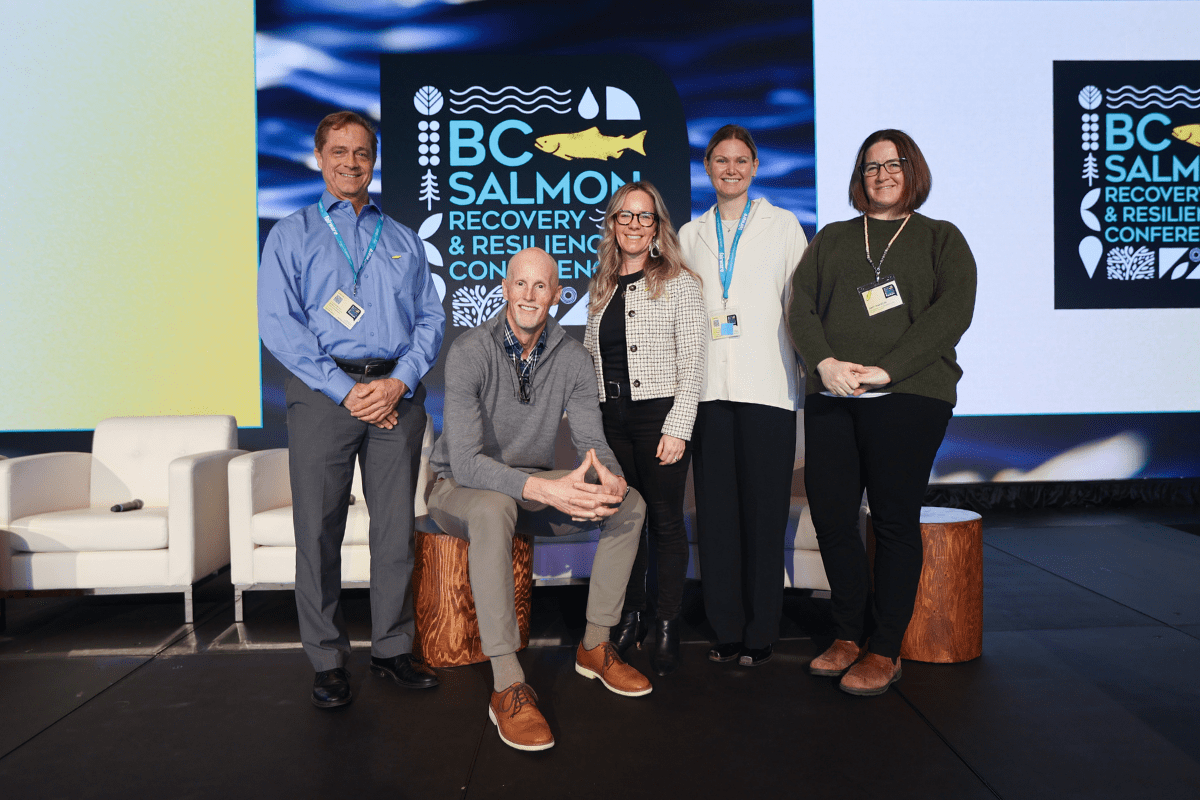Strengthening Salmon Resiliency: Collaboration, Courage, and the Future of Fisheries in BC
NewsSalmon conservation, community based fishing, and a strong food system can align to create a hopeful, shared future.

In early December, I had the privilege of attending the BC Salmon Recovery and Resilience Conference with conservationists, scientists, Indigenous leaders, and policy makers from across Canada and the U.S. to discuss salmon resiliency, climate change, and the role of collaboration in shaping the future of fisheries. Hosted by the Pacific Salmon Foundation and the First Nations Fisheries Council, it was heartening to be reminded that while salmon and the communities that depend on them are confronted with enormous challenges, we are all interconnected and we are stronger together.
The Resilience of Salmon in a Changing World
Our wild salmon are survivors—but they’re at a tipping point and they need time to adapt. Climate change is accelerating environmental shifts at rates so exponentially faster than anything our earth has ever seen, and those changes – including warming waters, higher winter water levels, and declining summer flows – threaten their habitats and the very existence of salmon runs. As Jonathan Moore, Professor of Aquatic Ecology & Conservation at Simon Fraser University noted, the effects of industries like forestry, agriculture, and mining, have the same effects on salmon habitat as climate change and so there are many actions that we can take to slow habitat change. Salmon are magnificent at adaptation – and we heard so many inspiring examples of salmon’s incredible abilities to adapt, survive, and thrive — but they need space, time, and protection to do so. Our collective responsibility is to ensure we take action to create the space and time they need to recover.
Collaboration Brings Hope
One of the conference highlights was being part of the Future Fisheries: Transformation of Salmon Fisheries panel alongside Scott Hinch (Professor of Fisheries Conservation at UBC), Amy Wakelin (Fisheries and Oceans Canada), Jeff Grout (Director of Salmon Management and Client Services at DFO), and Samantha Renshaw (Fisheries and Seafood Science Manager at Ocean Wise). It was truly a pleasure to share the stage with these leaders. Each brought inspiring perspectives, and we focused on sharing good news stories—proof that positive change is possible when we come together.
My own talk focused on the resiliency of salmon and the possibility of creating an alternative to top-down-managed fisheries designed for an industrial-scale, export-oriented, resource extraction fisheries system in Canada. I shared the inspiring example of collaboratively managed salmon fisheries in the Somass River Fisheries out of Port Alberni. There, since 2011, a roundtable – made up of members of the c̓išaaʔatḥ (Tseshaht) and Hupačasath First Nations, commercial and recreational fishing sectors, and the DFO – meet weekly during the fishing season to manage the fishery. They review test boat results, electronic fish counts, government data, and weekly catches across all sectors. Based on this shared information, they set fishing days, hours, and allowable catch—collaboratively, positively, and effectively. They elect for higher escapement numbers than the DFO mandates, reducing the number of fish that they harvest, allowing more spawners to return to the lake than required, and ensuring the long-term strength of their salmon runs. Fishing sectors regularly volunteer to transfer some of their total allowable catch to another sector to ensure fairness. As a result, the Somass River Fisheries have been the only consistently strong salmon fisheries in BC year after year for over a decade. This kind of collaborative approach is effective and is a model for how fisheries management should work: grounded in trust, data, local knowledge, and shared stewardship.
The panel wrapped up with a lively Q&A, including an engaging question from former Fishery and Oceans Minister Joyce Murray about the Owner-Operator policy in BC. It was a great way to advocate for fishing families and tie the discussion together.
Next Steps in Advocacy and Action
Right after the conference, I headed to Ottawa where I was invited to provide witness testimony to the Standing Committee on Fisheries and Oceans at the House of Commons during their review of the Fisheries Act. I spoke about the changes needed to better support community-based harvesters. The conversations at the conference and the panel discussions underscored the importance of continuing this advocacy work. Salmon resiliency depends on strong policies that prioritize both environmental protection and the livelihoods of fishing families.
We’re All Interconnected
What keeps me inspired is the interconnectedness of everything — communities, ecosystems, cultures, and perspectives. Our Indigenous fishing families regularly remind us that this world view – hishuk'ish tsawalk in Nuu-chah-nulth language – must underpin and inform our approach to fisheries management. As Dr Anne Willis, California Regional Director for American Rivers at University of California, Merced reminded us, "Conservation doesn’t mean the absence of people; it means the integration of people.” Conservation solutions require us to consider the big picture as we do at Skipper Otto. It’s clear that conservation, community-based fishing, and a robust food system can all align. These aren’t separate efforts but interconnected solutions that respect and honor diverse ways of knowing and being.
Yes, we are stronger together. But more than that, we are all interconnected. Our salmon, our communities, and our shared future are woven together—and by honoring this connection, we can secure the future of salmon for generations to come.
Thank you to everyone doing the hard work of conservation, collaboration, and advocacy, including all of our members who support our harvesters. All of our actions make a difference.
Written by: Sonia Strobel
Image credit: Pacific Salmon Foundation. Featured from left to right: Scott Hinch, Jeff Grout, Sonia Strobel, Samantha Renshaw, Amy Wakelin.
